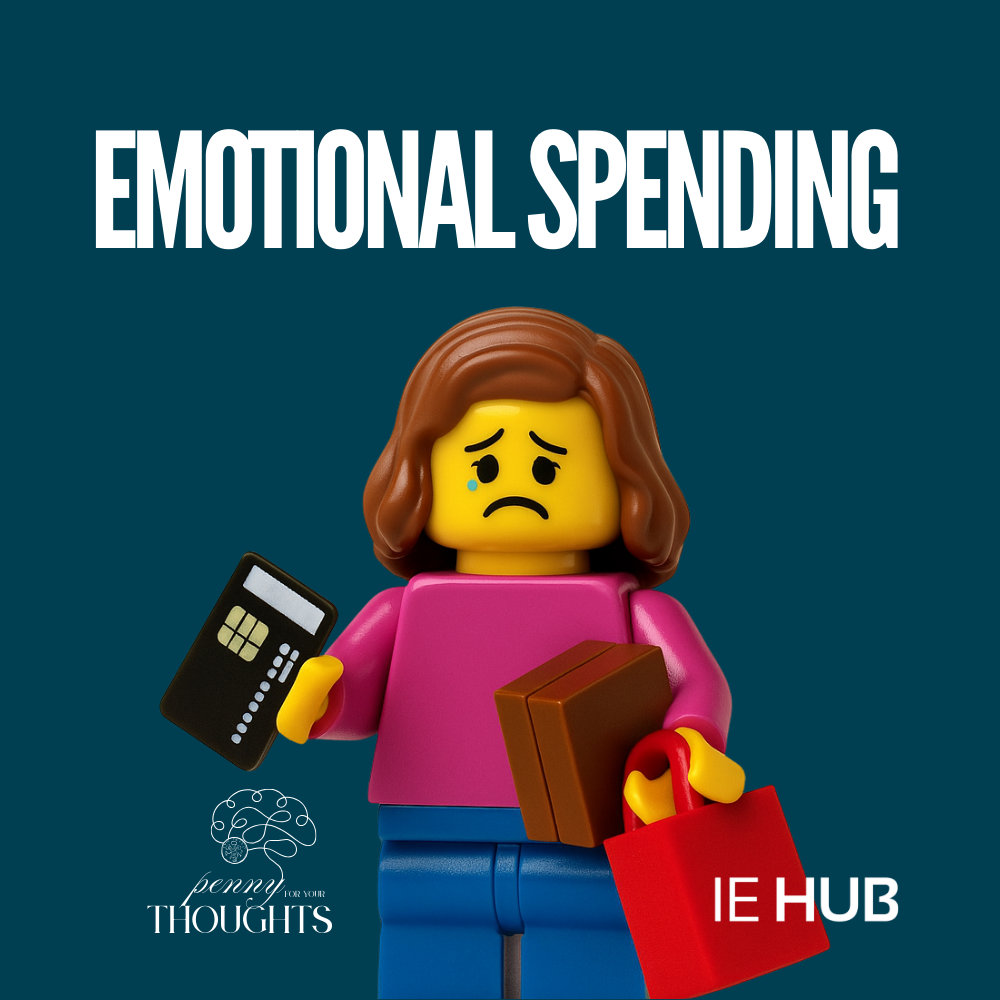
06 May
Why We Spend When We’re Sad
Have you ever found yourself scrolling through your favourite online shop, adding things to your basket that you don’t really need… but you’re having a bad day, so you think, “Go on then”? Same. That, right there, is a classic case of emotional spending, using money as a quick fix to lift your mood or distract from stress.
You’re not alone, and more importantly, you’re not irrational.
There’s actual psychology behind this behaviour.
Our moods and money are linked.
So, let’s break down why sadness so often leads to spending and what we can do about it.
The Emotional Triggers Behind Spending
When we feel low, sad, lonely, anxious, or just a bit meh- our brains naturally seek out comfort. For some, that’s food, for others it’s a good TV binge. But for many of us, it’s spending.
This type of behaviour is often referred to as emotional spending. It’s a way to self-soothe, a psychological attempt to lift your mood, distract yourself from stress, or fill an emotional gap.
And while it might work in the short term, that temporary boost can lead to regret, guilt, or even debt later on.
Sadness lowers our ability to resist impulsive behaviours and increases our need for quick wins, which is why we’re far more likely to click “buy now” when we’re not feeling our best.
The “Dopamine Hit” from Purchases
When you buy something, especially something new or exciting, your brain gets a hit of dopamine, the feel-good chemical.
It’s the same reward system that lights up when we eat chocolate, receive a compliment, or get likes on a post.
The catch? The dopamine boost from spending is short-lived, and it can leave you feeling even worse if the purchase wasn’t meaningful.
This can quickly lead to a cycle where we keep buying things to chase the high, without realising we’re feeding the very anxiety or sadness we’re trying to avoid.
How to Spot Emotional vs. Intentional Spending
So, how do you know if you’re spending emotionally or intentionally? Here are some quick tips to help:
| Emotional Spending | Intentional Spending |
| Triggered by a mood (sadness, stress, boredom) | Triggered by a need or planned desire |
| Instant gratification | Thought-about decision |
| Guilt or regret afterwards | Satisfaction or peace of mind |
| Happens quickly, often impulsively | Often involves comparison, budgeting, or research |
Ask yourself:
👉 Would I buy this if I wasn’t feeling this way?
👉 Do I already have something similar?
👉 Will this still feel like a good idea tomorrow?
Tips for Coping Without Spending
If emotional spending is something you relate to, you’re not doing anything wrong. But, there are other ways to support yourself that don’t involve parting with your money.
Here are some simple alternatives that can scratch the same psychological itch:
👉 Delay the spend. Give yourself a 24-hour rule. Often, the urge fades.
👉 Create a “feel-good” list. Write down free or low-cost activities that boost your mood- like calling a friend, going for a walk, dancing in your kitchen, or journaling.
👉 Use a wishlist. Add items to a wishlist instead of your cart. You’ll still get the feeling of browsing and curating, without the regret.
👉 Check in with yourself. Are you hungry? Tired? Lonely? Sometimes it’s not sadness, it’s something else that’s easier (and cheaper) to solve.
👉 Track your spending triggers. Keep a little journal or note on your phone of what emotions led to certain purchases. Patterns are powerful. Or use a free tool like IE Hub to track your income and expenses and spot spending patterns over time.
Final Thoughts
Spending when we’re sad doesn’t mean we’re reckless or bad with money, it means we’re human. The key is awareness.
When you know what your brain is doing and why, you can start to interrupt the automatic patterns and make choices that actually support you emotionally and financially.
So next time you’re having a rough day and feel tempted to splurge, ask yourself what you really need. It might be connection, comfort, or simply a break. Not another pair of shoes.
If you’re struggling emotionally, you may also find support through Mind UK or your local NHS mental health services.